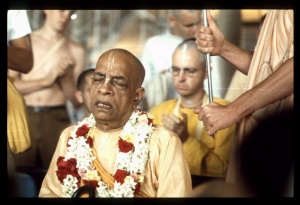SB 5.13.23

A.C. Bhaktivedanta Swami Prabhupada
TEXT 23
- namo mahadbhyo 'stu namaḥ śiśubhyo
- namo yuvabhyo nama āvaṭubhyaḥ
- ye brāhmaṇā gām avadhūta-liṅgāś
- caranti tebhyaḥ śivam astu rājñām
SYNONYMS
namaḥ — all obeisances; mahadbhyaḥ — unto the great personalities; astu — let there be; namaḥ — my obeisances; śiśubhyaḥ — unto those great personalities who appear as boys; namaḥ — respectful obeisances; yuvabhyaḥ — unto those who appear as young men; namaḥ — respectful obeisances; ā-vaṭubhyaḥ — unto those who appear as children; ye — all those who; brāhmaṇāḥ — self-realized in transcendental knowledge; gām — the earth; avadhūta-liṅgāḥ — who remain hidden under different bodily guises; caranti — they traverse; tebhyaḥ — from them; śivam astu — let there be all good fortune; rājñām — unto the royal dynasties or kings (who are always very puffed up).
TRANSLATION
I offer my respectful obeisances unto the great personalities, whether they walk on the earth's surface as children, young boys, avadhūtas or great brāhmaṇas. Even if they are hidden under different guises, I offer my respects to all of them. By their mercy, may there be good fortune in the royal dynasties that are always offending them.
PURPORT
King Rahūgaṇa was very repentant because he had forced Jaḍa Bharata to carry his palanquin. He therefore began offering prayers to all kinds of brāhmaṇas and self-realized persons, even though they might be playing like children or hiding in some guises. The four Kumāras walked everywhere in the guise of five-year-old boys, and similarly there are many brāhmaṇas, knowers of Brahman, who traverse the globe either as young men, children or avadhūtas. Being puffed up due to their position, the royal dynasties generally offend these great personalities. Therefore King Rahūgaṇa began to offer his respectful obeisances unto them so that the offensive royal dynasties might not glide down into a hellish condition. If one offends a great personality, the Supreme Personality of Godhead does not excuse one, although the great personalities themselves might not take offense. Mahārāja Ambarīṣa was offended by Durvāsā, who even approached Lord Viṣṇu for pardon. Lord Viṣṇu would not grant him pardon; therefore he had to fall down at the lotus feet of Mahārāja Ambarīṣa, even though Mahārāja Ambarīṣa was a kṣatriya-gṛhastha. One should be very careful not to offend the lotus feet of Vaiṣṇavas and brāhmaṇas.